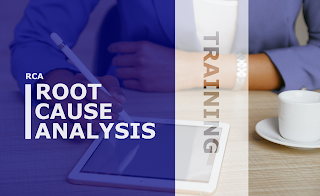Learn How to use Root Cause Analysis (RCA) to reduce Total Cost Of Risk (TCOR).

Kilchiro Toyoda, founder of Toyota said that
So, Enhance problem-solving and trouble-shooting effectiveness
Root Cause Analysis
Presented By : Tonex Training
RCA can reveal earlier concealed interaction between causes and symptoms and supply continuing solutions that will result in bigger safety and lower costs. By successfully getting to the root cause of one problem, organizations can solve several others along the way – which can have a important impact on TCOR, Total Cost of Risk.
Tonex offers 3 days training on Root Cause Analysis what covers this problem-solving process for conducting an investigation into an identified incident, problem, concern or non-conformity in many fields.
Want To Learn More ?
Visit Tonex.Com for Root Cause Analysis Training

Kilchiro Toyoda, founder of Toyota said that
Every defect is a treasure, if the organization can uncover its cause and work to prevent it across the enterprise.
So, Enhance problem-solving and trouble-shooting effectiveness
Root Cause Analysis
Presented By : Tonex Training
RCA can reveal earlier concealed interaction between causes and symptoms and supply continuing solutions that will result in bigger safety and lower costs. By successfully getting to the root cause of one problem, organizations can solve several others along the way – which can have a important impact on TCOR, Total Cost of Risk.
DON'T JUMP TO CONCLUSION WITHOUT DIGGING THE PROBLEM DEEPER :)
What is Root Cause Analysis ( RCA) ?
Root Cause Analysis, RCA is a method for investigating the key causes of a problem or event with the goal of implementing the most effective solutions to prevent the problem or Event from re-occurences.Why Do You Need Root Cause Analysis ?
- To find out the main factors behind existing problem.
- To perform an effective strike over existing problem to say it goodbye forever.
- Getting aware of similar types of problem in future.
- To reduce Total Cost Of Risk (TCOR).
Tonex Root Cause Analysis, RCA Training Reviews :
Tonex offers 3 days training on Root Cause Analysis what covers this problem-solving process for conducting an investigation into an identified incident, problem, concern or non-conformity in many fields.
Learn about :
- What Root Cause Analysis is
- Root Cause Analysis Methods and Techniques
- How to Start and Complete Root Cause Analysis
- Methods of Root Cause Analysis
- Explains expressed RCA as a holistic approach and analytical and creative thinking tools
- Techniques and tools to incorporate elements of equipment,
- Enhance problem-solving and trouble-shooting effectiveness
- Plan and create model and more.
Want To Learn More ?
Visit Tonex.Com for Root Cause Analysis Training
Comments
Post a Comment